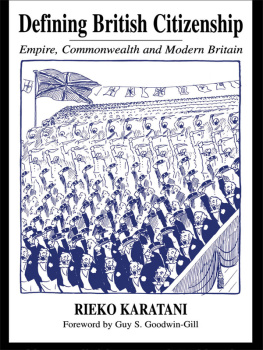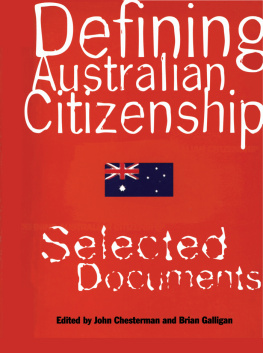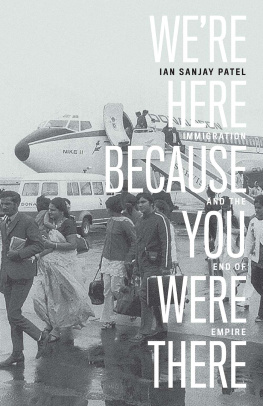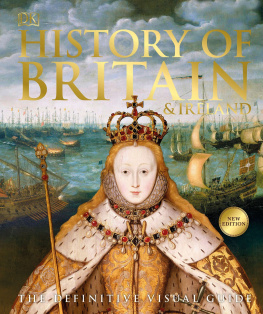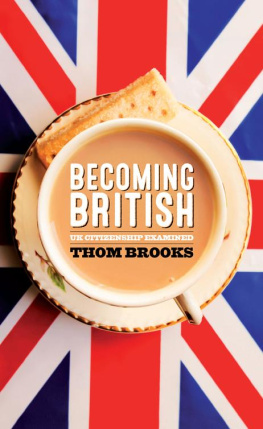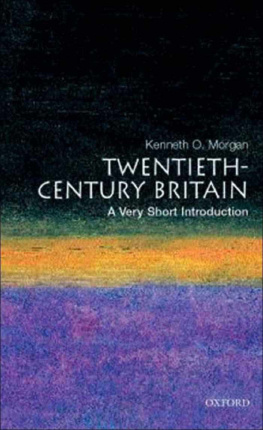DEFINING BRITISH CITIZENSHIP
CASS SERIES: BRITISH POLITICS AND SOCIETY
SERIES EDITOR: PETER CATTERALL ISSN: 14671441
Social change impacts not just upon voting behaviour and party identity but also the formulation of policy. But how do social changes and political developments interact? Which shapes which? Reflecting a belief that social and political structures cannot be understood either in isolation from each other or from the historical processes which form them, this series will examine the forces that have shaped British society. Cross-disciplinary approaches will be encouraged. In the process, the series will aim to make a contribution to existing fields, such as politics, sociology and media studies, as well as opening out new and hitherto-neglected fields.
Peter Catterall (ed.), The Making of Channel 4
Brock Millman, Managing Domestic Dissent in First World War Britain
Peter Catterall, Wolfram Kaiser and Ulrike Walton-Jordan (eds), Reforming the Constitution: Debates in Twentieth-Century Britain
Brock Millman, Pessimism and British War Policy, 19161918
Adrian Smith and Dilwyn Porter (eds), Amateurs and Professionals in Postwar British Sport
Archie Hunter, A Life of Sir John Eldon Gorst: Disraelis Awkward Disciple
Harry Defries, Conservative Party Attitudes to Jews, 19001950
Virginia Berridge and Stuart Blume (eds), Poor Health: Social Inequality before and after the Black Report
Stuart Ball and lan Holliday (eds), Mass Conservatism: The Conservatives and the Public since the 1880s
Rieko Karatani, Defining British Citizenship: Empire, Commonwealth and Modern Britain
Defining British Citizenship
Empire, Commonwealth and Modern Britain
RIEKO KARATANI
Kyushu University, Japan
Foreword by
Guy S.Goodwin-Gill
First published in 2003 in Great Britain by
FRANK CASS PUBLISHERS
Crown House, 47 Chase Side
London N14 5BP
This edition published in the Taylor & Francis e-Library, 2005.
To purchase your own copy of this or any of Taylor & Francis or Routledges collection of thousands of eBooks please go to www.eBookstore.tandf.co.uk.
and in the United States of America by
FRANK CASS PUBLISHERS
c/o ISBS, 5824 N.E.Hassalo Street
Portland, Oregon, 972133644
Website:www.frankcass.com
Copyright 2003 R.Karatani
British Library Cataloguing in Publication Data
Karatani, Rieko
Defining British citizenship: empire, commonwealth and modern Britain.(Cass series. British politics and society)
1. CitizenshipGreat BritainHistory 2. Citizenship Government policyGreat Britain 3. Great BritainEmigration and immigrationGovernment policyHistory
I. Title
323.60941
ISBN 0-203-48557-2 Master e-book ISBN
ISBN 0-203-58299-3 (Adobe eReader Format)
ISBN 0-7146-5336-5 (cloth)
ISBN 0-7146-8298-5 (paper)
ISSN 1467-1441
Library of Congress Cataloging-in-Publication Data
Karatani, Rieko, 1966
Defining British citizenship: empire, commonwealth, and modern Britain/Rieko Karatani.
p. cm.(Cass seriesBritish politics and society, ISSN 14671441)
Includes bibliographical references and index.
ISBN 0-7146-5336-5 (cloth)
1. CitizenshipGreat Britain. 2. Emigration and immigration lawGreat Britain. I. Title. II. Series.
KD4050. K37 2002
342.41083dc21 2002026783
All rights reserved. No part of this publication may be reproduced, stored in or introduced into a retrieval system or transmitted in any form or by any means, electronic, mechanical, photocopying, recording or otherwise, without the prior written permission of the publisher of this book.
Foreword
Everyone has the right to a nationality, but which one? And what does it mean, in terms of rights and duties, expectations and responsibilities, to be the citizen of a State? Even identifying those who are formally members of a particular political community at a particular time and place is rarely as easy as some lawyers and ideologues would like to believe. Nationality is not an absolute, but often relative; not merely a legal tag, but also a factual condition, a matter of social attachment, sentiments, interests and intent.
Given Britains history of engagements across the globe and the natural persistence of the resulting bonds of culture, language and blood, it is hardly surprising that the concepts of nationality, citizenship of the United Kingdom and Colonies, and British subject, among others, have proved troublesome and complex. For those steeped in the simplicity of a single, simple citizen-State relationship, the manner in which the British Crown and Parliament treated their peoples must have appeared strange, at times even devious and divisive, particularly over the last 40 years or so, when debate and legislation were often driven by crude immigration control arguments and racial considerations.
That was only ever part of the picture, however, and on closer examination the truth of the case proves to be rather more multifaceted a mix, indeed, of laudable aspects, historical ideals, halfremembered principles, post-colonial debts (not always honoured), and those regrettable tendencies. Dr Karatanis book throws light on that truth, bringing into the open much that had been hidden and much else that was conveniently ignored for the sake of ideological assumptions of one colour or another.
As she points out, the origins of what we are finally beginning to recognize as British citizenship lie not in an idealized conception of the citizen-State relationship, so much as in the essentially personal link between subject and sovereignthe bonds of loyalty and allegiance. It was these bonds, among others, which allowed the British Empire to include, without regard to place or race, disparate peoples living in territories separated by thousands of miles. The Crown was indivisible and all its subjects enjoyed a common status, so went the theory, and benefited from the protection of the sovereign. This common status (not equality as such, of course) characterized the nineteenth-century British sense of empire, extending even into the mid-twentieth century, so that it could be proclaimed in 1948 and after, without hesitation or doubt, that British subject and Commonwealth citizen had the same meaning.
The reality of a common bond and a common status, with the Crown at the centre, reached its ideological zenith in Victorian times. Like the Crown itself, though, it came to be tested as the self-governing Dominions began to assert their autonomy, and as Australia, Canada and South Africa laid down racially determined immigration laws which included no exceptions for fellow British subjects.
At home, it seems that the British were never very good at institutionalizing citizenship; hence, todays debate about civics and classes in what it is to be British. We seem never to have had much time for national days, though more inclined to celebrate (rather for ourselves, perhaps), the sovereigns occasions, such as birth, marriage, accession, death and jubilees.
Perhaps it is not surprising, therefore, that the United Kingdom held out longest against radical change, against the reduction of an imperial and inclusive British subjecthood, and against the fragmentation into mutually exclusive nationalities which accompanied the Crowns increasing divisibility and the Empires evolution into Commonwealth. Dr Karatani shows how this came about, and how the mixture of ideals, ideology, historical baggage and a felt need, in particular, for control over new Commonwealth immigration combined to produce increasingly complicated relationships among those who, in some way, enjoyed the Crowns protection. She shows, too, the extent to which the debate over immigration policy became a determinant of who belongs to the United Kingdom, whereas most countries take the

